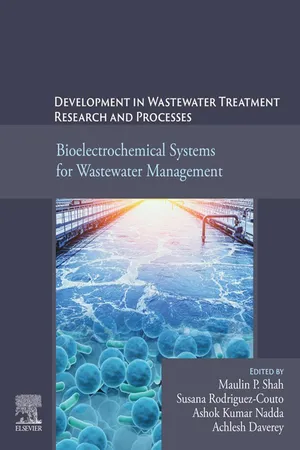
eBook - ePub
Development in Wastewater Treatment Research and Processes
Bioelectrochemical Systems for Wastewater Management
- 298 pages
- English
- ePUB (mobile friendly)
- Available on iOS & Android
eBook - ePub
Development in Wastewater Treatment Research and Processes
Bioelectrochemical Systems for Wastewater Management
About this book
Industrial wastewater contains a large variety of compounds, such as hazardous organic pollutants, heavy metals, salts and nutrients, which makes its treatment challenging. On the other hand, the sewage treatment with existing technologies is not cost-effective due to high energy demand and contributes to greenhouse gas emission. Thus, the use of conventional water treatment methods is neither sustainable nor always effective. In this sense, BESs has emerged as a promising technology to treat complex industrial wastewater with a sustainable manner. Development in Wastewater Treatment Research and Processes: Bioelectrochemical Systems for Wastewater Management analyses and discusses the potential of microbial and electrochemical based hybrid processes for the treatment of complex industrial wastewater along with the recovery of valuable compounds and water reutilization. The most significant advantages of BES are high effectiveness, low toxicity, gentle operation conditions, environmentally friendly treatment without sludge accumulation and energy conservation. Bioelectrochemical systems (BES) are emerging as an exciting platform to convert chemical energy of organic wastes into electricity or hydrogen or value-added chemical commodities. In addition, recent and future trends in BES are highlighted.
- Discusses the fundamentals of biological wastewater treatment and bio-electrochemical systems, advantages, limitations and promising solutions of different types of energy recovery options from wastewater
- Presents the recent trends and developments in BES for achieving the sustainable wastewater treatment
- Covers the applications of BES and BES-based hybrid treatment technologies for wastewater treatment
- Includes carbon capture and resource recovery other than energy from wastewater using BES systems
- Addresses the challenges in the full-scale implementation of BES in existing and new wastewater treatment plants
Frequently asked questions
Yes, you can cancel anytime from the Subscription tab in your account settings on the Perlego website. Your subscription will stay active until the end of your current billing period. Learn how to cancel your subscription.
No, books cannot be downloaded as external files, such as PDFs, for use outside of Perlego. However, you can download books within the Perlego app for offline reading on mobile or tablet. Learn more here.
Perlego offers two plans: Essential and Complete
- Essential is ideal for learners and professionals who enjoy exploring a wide range of subjects. Access the Essential Library with 800,000+ trusted titles and best-sellers across business, personal growth, and the humanities. Includes unlimited reading time and Standard Read Aloud voice.
- Complete: Perfect for advanced learners and researchers needing full, unrestricted access. Unlock 1.4M+ books across hundreds of subjects, including academic and specialized titles. The Complete Plan also includes advanced features like Premium Read Aloud and Research Assistant.
We are an online textbook subscription service, where you can get access to an entire online library for less than the price of a single book per month. With over 1 million books across 1000+ topics, we’ve got you covered! Learn more here.
Look out for the read-aloud symbol on your next book to see if you can listen to it. The read-aloud tool reads text aloud for you, highlighting the text as it is being read. You can pause it, speed it up and slow it down. Learn more here.
Yes! You can use the Perlego app on both iOS or Android devices to read anytime, anywhere — even offline. Perfect for commutes or when you’re on the go.
Please note we cannot support devices running on iOS 13 and Android 7 or earlier. Learn more about using the app.
Please note we cannot support devices running on iOS 13 and Android 7 or earlier. Learn more about using the app.
Yes, you can access Development in Wastewater Treatment Research and Processes by Maulin P. Shah, Susana Rodriguez-Couto, Ashok Kumar Nadda, Achlesh Daverey, Maulin P. Shah,Susana Rodriguez-Couto,Ashok Kumar Nadda,Achlesh Daverey in PDF and/or ePUB format, as well as other popular books in Technology & Engineering & Microbiology. We have over one million books available in our catalogue for you to explore.
Information
Table of contents
- Title of Book
- Cover image
- Title page
- Table of Contents
- Copyright
- Contributors
- Chapter 1 Microalgal mediated bioelectricity generation and concomitant value-added products recovery from wastewater treatment in the bioelectrochemical system: Current status and future perspectives
- Chapter 2 Algal microbial fuel cell: An innovative and accessible approach
- Chapter 3 Key role of microorganisms in industrial wastewater treatment
- Chapter 4 Membrane-integrated BES for wastewater reclamation
- Chapter 5 Wastewater remediation for reuse through emerging technologies
- Chapter 6 Bioelectrochemical systems: Understanding the basics and overcoming the challenges
- Chapter 7 Emerging trends of cyanobacteria-based microbial fuel cells as an alternative energy source
- Chapter 8 Bioelectrochemical systems: Basic concepts and types
- Chapter 9 Anode modification: An approach to improve power generation in microbial fuel cells (MFCs)
- Chapter 10 Influence of operational parameters on the performance of microbial fuel cells
- Chapter 11 Development of bioelectrochemical systems integrated nanocomposite membranes for wastewater management
- Chapter 12 Industrial wastewater treatment using bioelectrochemical systems and the potential for energy recovery
- Chapter 13 Microbes and wastewater treatment
- Chapter 14 Challenges in the scale-up of MES for wastewater treatment
- Index